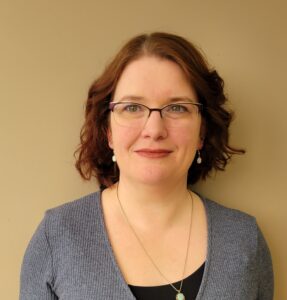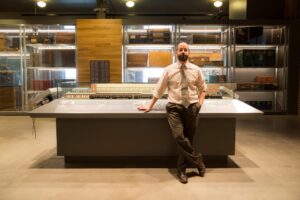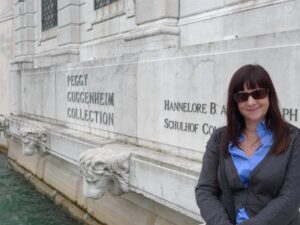
Lisa Bower has held the position of Assistant Curator and Registrar for the Nova Scotia Museum’s Cultural History collection since 2013, and has worked at community and provincial museums for most of her career. Lisa has a Bachelor of Arts in Anthropology from St Mary’s University, a collections management certification from the University of Victoria and in Nov.2022, graduated from Dalhousie University, earning her M.A. in History. In 2021 she was awarded the Bowes Scholarship in History. Lisa has also worked as a researcher for a local documentary production company sourcing historic images and film footage. Lisa is an avid embroiderer and is a member of the Embroidery Association of Canada and Halifax’s Town Clock Stitchers embroidery guild. She has received instruction in a variety of embroidery techniques from tutors trained at the Royal School of Needlework and presented a talk about her MA research on the African School sampler for the virtual lecture series, “Ornamental Embroidery”, led by needlework historian and Research Fellow of the V&A Museum, Dr. Lynn Hulse. Lisa works with a diverse range of material culture daily at the NSM but is particularly interested in recouping identities of those who mark stories through thread.
Category Archives: Uncategorized
Carole MacDonald
Carole MacDonald has an MA, Atlantic Canada Studies, Saint Mary’s University, a B Journalism, University of Kings College, Halifax, a B.A English (minor, political science) Mount St. Vincent University, Halifax, 1976 and a diploma in Education as well as certificates in business, community economic development and adult education. Her book Historic Glace Bay was published in 2009. Her biography of Col. The Honourable Gordon Harrington, Nova Scotia’s 11th premier is yet unpublished. She has made presentations about Harrington’s career to the Nova Scotia Historical Society, the Nova Scotia Medical History Society and the Glace Bay Historical Society.
Hilary Doda
Dr. Hilary Doda is an Assistant Professor at Dalhousie University, and lectures in Costume Studies at the Fountain School of Performing Arts. She holds an Interdisciplinary PhD from Dalhousie University, for research exploring the material culture of dress and textiles in the early modern Atlantic world. Recent publications include an article in Acadiensis on Acadian needlework tools. Her current research on traditional weaving in Cape Breton has been supported by a postdoctoral fellowship at Saint Mary’s University.
Magen Hudak

Magen Hudak completed a BA in Philosophy (2011) and a MA in Atlantic Canada Studies (2014) at Saint Mary’s University, and in 2012 completed a MA at the University of Toronto in Slavic Literatures and Languages. From 2014-2018, Magen attended Trent University’s School for the Study of Canada doctoral programme. Her MA Thesis, which this lecture is based on, won the Governor General’s Gold Medal in 2015.
Wade Pfaff
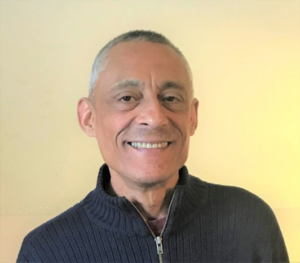
Wade Pfaff was born in Toronto during the Civil Rights Movement to a family of South African educators. A musician, creative artist and academic, Wade’s interests range from conducting Canadian Black history research, to studying and playing music from the trans-Atlantic diaspora on guitar and drums, to developing cultural education programs for marginalized youth. After completing a Bachelor of Community Studies degree and a Bachelor of Arts in Anthropology from Cape Breton University, where he was greatly influenced by Dr. Graham Reynolds, he went to Halifax to obtain a Master of Arts in Social Anthropology at Dalhousie University under the supervision of Dr. Afua Cooper. Wade is a Visiting-scholar-in-residence at Cape Breton University’s Centre for Sound Communities where he continues to study the relationship between the music of trans-Atlantic Black cultures during the early 20th century (especially Jazz and Blues) and improvements in civil rights for people-of-colour that came later in the century in Canada.
Steven Schwinghamer
Judith Fingard
Judith Fingard, a retired history professor and a former president of the RNSHS as well as a fellow of the RNSHS and of the Royal Society of Canada, published a number of papers in the 1980s and 90s relating to the emergence of the black middle class in Halifax. This presentation covers some of the same ground, but with an emphasis on the opportunities for young women to improve their life chances in the face of the significant obstacles they encountered.
Paul Fraser Armstrong
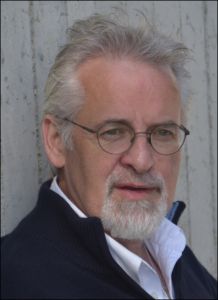
Trained as an historical sociologist, Paul has held posts in economic development in municipalities in both Nova Scotia and Ontario. More recently, he was one of the organizers of the Irish Halifax SSHRC project and did research there on the early Mechanics’ Library in Halifax. He did his doctorate at Dalhousie University with work on the intellectual genealogy of the Antigonish Movement. His research is focussed now on the theory of civil society. He has considerable experience with non-profits at both the Board and staff level, and holds offices currently as President, Maritime Institute for Civil Society, Chair, KITH Observatory, Inc., and Treasurer, Genealogical Association of Nova Scotia.
Afua Cooper
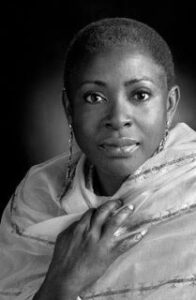
Dr. Afua Cooper is professor of Black and African Diaspora Studies at Dalhousie University. She led the scholarly panel on Dalhousie’s History on Slavery and Race. An accomplished poet, Dr. Cooper was recently awarded the Portia White Prize for artistic and cultural excellence. On April 9, 2021 Dalhousie University announced that Dr. Cooper will be leading a three-year $1M+ federally funded project entitled ‘A Black People’s History of Canada.’ See the Dalhousie University announcement for more information.
Laurie Glenn Norris
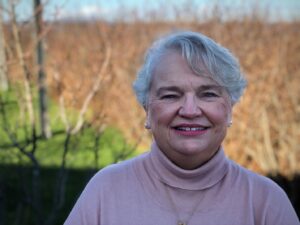
Laurie Glenn Norris is a writer of historical fiction and non-fiction, with a particular interest in the stories of women in nineteenth-century Nova Scotia. She is the author of three books, Cumberland County Facts and Folklore (Nimbus, 2009), Haunted Girl: Esther Cox and the Great Amherst Mystery (Nimbus, 2012; finalist for the 2013 Democracy 250 Atlantic Book Award for Historical Writing, and optioned for a feature film), and Found Drowned (Vagrant Press, 2019), her first novel.
Glenn Norris is currently transcribing and editing a book of letters whose working title is Paper Remains: The Life of a Nova Scotia Family in Documents.
Glenn Norris holds an M.A. in History in Art from the University of Victoria. She has worked in the heritage and cultural field for over 25 years, and is currently employed with the Joggins Fossil Institute. She lives in River Hebert, Nova Scotia, with her husband Barry Norris, a freelance editor, their cat Dinah, and lots of books.




